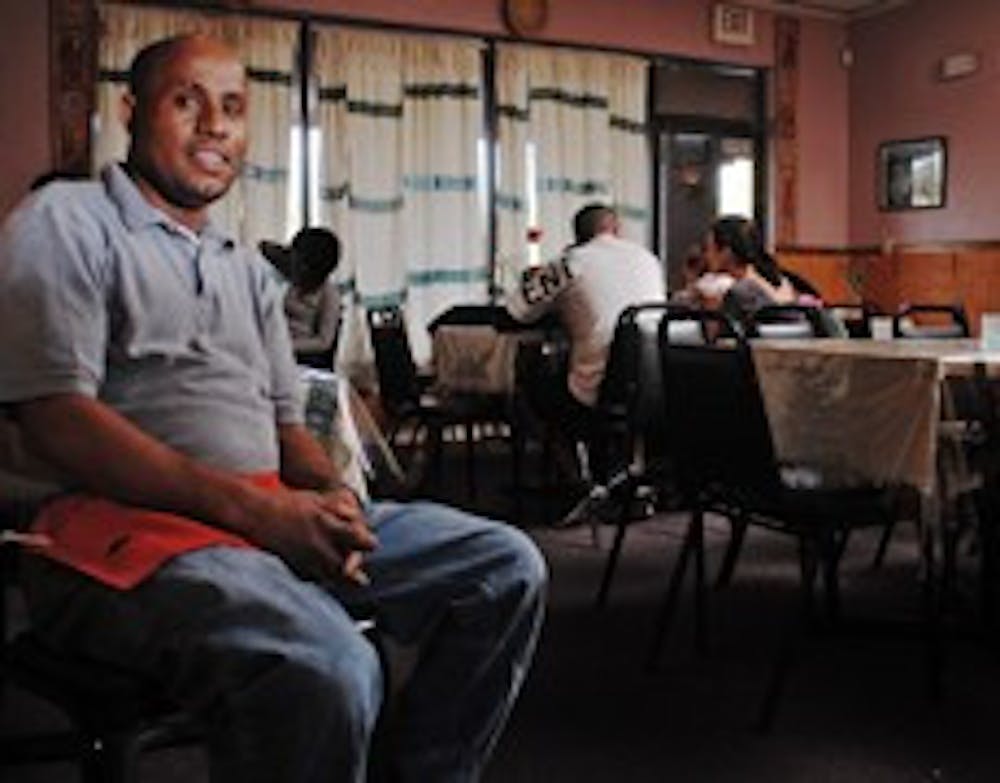Campus towns seem split between two distinct mindsets: students who choose cheap pizza and Pop Tarts as their staple foods, and those who constantly experiment with new flavors and cultures.
If you empathize with the latter category, you should throw "Ethiopian" on your list of cuisines to try. Little known to most, this food genre is surprisingly accessible to students. There are two specialized Ethiopian restaurants right next to campus (Café Lalibela, 849 W. University Drive, and Blue Nile Café, 993 E. University Drive, No. 112), and both offer patrons a different perspective on the unique fare.
The basic layout of a traditional meal can be found at both locations. The meals consist mostly of meat- or vegetable-based stews (known as "wat"), made with specialized blends of seasonings and served on top of injera, the key component of Ethiopian cooking.
"It's prepared almost like a one-sided pancake, and takes about five hours [to make]," said Café Lalibela manager Salem Beyene. Injera is made from teff, a small indigenous whole grain and indeed has a shape and texture similar to crepes. However, its absorbent surface, healthy simplicity and sourdough-bread-like taste make it a perfect staple food. Ethiopian diners tear off small pieces of injera to pinch off bites of wat; the utensil is actually part of the meal.
"We don't share recipes or compete, really," Beyene said. "But some [dishes at each restaurant] are pretty similar."
Wat ingredients vary a bit, but both menus have standard offerings, including chicken, beef, collard greens and lentils. Presentation and the spices are largely what set this cuisine apart, and both locations put their own twist on it.
Visit Lalibela if you're looking for a traditional sit-down experience. The layout is simple, with clothed square tables and tasteful décor. Drawings from the Ethiopian bible and color photos of the country line the walls.
The restaurant offers a weekday lunch sampler that allows you to pick three styles of meat and veggie wats for less than $7.
Highlighting the fare here is Doro Wat, a rich and spicy simmered chicken stew. But the real draw of Café Lalibela is the hot tea and coffee menu, traditionally brewed and flavored. The Yekemen Shai is worth its own trip, a remarkably subtle tea blend of clove, cadmaron and cinnamon. Desserts are decent, but expensive — quiet dining and consistently good meals are better features.
Blue Nile Café offers more of a lounge atmosphere that supports a night out. The back room is furnished with woven basket tables and hookah-style stools, and while service tends to be slow, this restaurant also provides a positive dining experience.
College students might enjoy the more group-minded menu, with its strong points at appetizers, platters and alternative eating options. Try some Red Sea Hummus (prepared with olive oil and chili powder, served with pita bread) before splitting a Vegan Sampler. All these wat options are great for the vegetarian or health-conscious. And the taste is simply indescribable. The standout item is Shuro Watt, a blend mixture of sundried tomatoes and chickpeas. It's also flavored with bebere (an indigenous red chili spice mix) and has a smooth saucy texture. Mix it with the yellow squash or eggplant stews and share it with friends.
"Modern restaurants [in America] usually have a defensive feel, everyone kind of guarding their own dish," said undeclared freshman Alex Humphrey. "Here there's a more communal feel, because of the sharing and the utensils. There's a feeling of intimacy this way."
Patrons may even want to partake in the Ethiopian custom of feeding his neighbor the first bite, a generous portion of injera-wat.
"Food is always better when fed to you," Humphrey said. "Nothing really can taste bad when it's a gift. A taste jubilee, if you will, or jamboree."
So ethnic food aficionados should put a star on their map next to Ethiopia, and next to both Café Lalibela and Blue Nile restaurants in Arizona. Each restaurant has its various pros and cons, but are both noteworthy for the fares' quality and distinctiveness. While the dining style may be an initial system shock and the spices a stark change in diet, even non-adventurous eaters should take advantage of two tremendous Ethiopian experiences just off campus.
Reach the reporter at: trabens@asu.edu.




